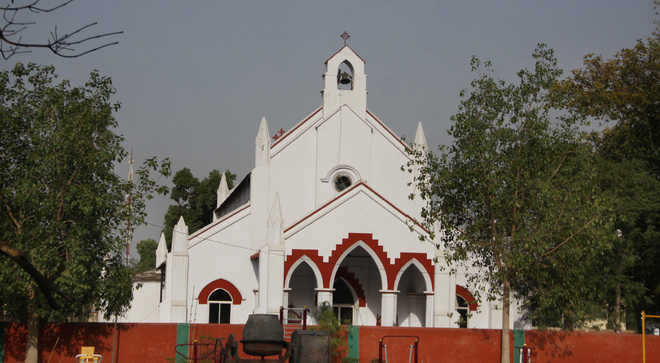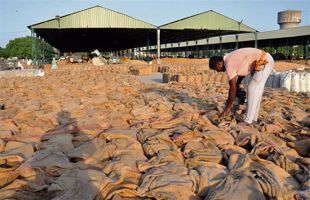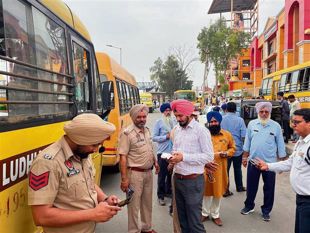
Many buildings in the Jalandhar Cantonment are reminiscent of the British era. A view of the St Luke’s Church Photo: Sarabjit Singh
After Maharaja Ranjit Singh’s death in 1839, confusion and disorder began to prevail. The British army immediately annexed the Bisht Doab and formed it into a commissionerate in 1847. The first Commissioner was John Lawrence with his headquarters at Jullundur. Simultaneously, Brig HM Wheeler with his two infantry battalions and two artillery companies entered Jullundur and occupied the area we now call Jalandhar Cantonment. The area during that time belonged to Rai Sikhs. They were evicted and resettled at Moranwali near Jalandhar. The Jalandhar Tribune takes you to the journey of the Jalandhar Cantonment to bring out the historical significance of one of the oldest cantonments in the country.
Rachna Khaira
Tribune News Service
Jalandhar, June 4
The Jullundur cantonment officially came into being on May 1 in 1849 in an area of 4,463 acres. Brig HM Wheeler was unofficially appointed as the first commander of the Jalandhar garrison having under command a light cavalry regiment (214 men), a troop of horse artillery (two guns with 42 gunners) and two native infantry battalions (1,045 men). The garrison was operationally and administratively responsible for the area up to Multan.
Mutiny of 1857
Although the mutiny of 1857 was a relatively quiet period in the garrison area of the Jullundur cantonment, the only major incident was a revolt by some troops of the native infantry stationed here. They were disarmed, but managed to escape and make their way to Delhi.
Markets enliven area
The period till 1900 was a little quit for the cantonment with the area being used as a staging-cum-transit camp for the troops moving to turbulent and operationally active North West Frontier Province (now in Pakistan). However, a need was being felt to upgrade the facilities to cater to a large amount of troops present in the cantonment. The Jullundur cantonment was an essential Royal Artillery station. The artillery occupied the present 11 Corps operating the signal area. This area is still called Royal Artillery (RA Lines). Later, the Topkhana Bazaar came up somewhere around 1880. The Cantonment Bazaar too began to get established after few years.
Civic development begins
The Cantonment railway station was commissioned in 1903. In 1904, when the Jullundur garrison was redesignated as the Jullundur Brigade under Major General JAH Pollock, civic development began to be seen inside the cantonment. Mechanical transport was first inducted in 1911 along with the introduction of the telephone, electricity and piped water services.
Cholera, flood hit station
Cholera hit the station in 1872 and claimed several lives. The Queen’s own 54th regiment lost 15 men including a woman and a child. However, within two years, the station was again hit by disaster floods reported twice in 1875 and 1878. The floods created massive destruction in Jalandhar and Nakodar. Nearly two British officers lost their lives during the relief operations and were awarded posthumously for their devotion to duty. It was in August 1878 when the heaviest rainfall of 384.8 mm was recorded on a single day in Jalandhar. The troops deployed in the Jullundur cantonment participated actively in flood relief operations and built a great harmony with their civil counterparts.
Jullundur Club
During 1905, a need was being felt to have some social place to meet the social needs of the British army families stationed inside the cantonment. So, in 1909, the Jullundur club came into being and soon became the bustling point with evening parties and other social welfare activities.
Glimpse of daily life
Captain Ulric Nisbet of the 3/23rd Sikhs in Jullundur stationed here in 1918 used to write his daily diary. An extract dated November 29 in 1918 reads – “There was a cricket match between the 25th Londoners and the station followed in the evening by a café chantant at which the Londoners provided music. Prawns and oysters transported from Karachi were served”. In another place he wrote- “Day followed with the same unvarying routine. We played polo, cricket, went on night hunt armed with .22 or a lance, took language from a Munshi, danced the night away and went partridge and buck hunting”.
During General R Dyer’s stay in 1918 he wrote that he invited the General and his wife for good hard sets of tennis with the women after which there was tiffin and tea. He observed again – “When Christmas arrived, we put dinner jackets and the New Year was celebrated with a fancy dress ball at the club”. A last entry before he sailed to England in early April 1919 reveals: “There are hints to that there will be a sudden alarm soon”. A few days later Amritsar erupted into flames with the massacre at the Jallianwala Bagh.
Military School comes up
Brig Gen R Dyer was succeeded by Col WF Banbridge who organised the first flower show in March 1924 at his residence now the headquarters of an Infantry Brigade officers’ mess. This was also the year when the foundation of Company Bagh (now Jawahar Park) was laid. The foundation stone of King George V Military School was also laid by the then Prince of Whales on February 25 in 1922. The present HQ building is the erstwhile school which is now located in Chail. In contrast to our present-day military schools, around 90 per cent students of every course of pre-independence era were selected as officers.
Cantonment expansion
The cantonment expanded vastly during the war years from 1939 to 1945. Including the construction of the 500-bed Military Hospital and a transit camp, a Dogra regimental centre was also opened in the area. Besides, a mule training centre, a veterinary hospital, a cinema, a defence cinema and Women Auxiliary Corps (Indian) was also launched during the time.
Effect of Partition riots
All British regiments left Jullundur in 1939 for various combat zones during the Second World War. A token force was left behind. Later, Partition riots and influx of refugees placed a heavy burden on the slender resources of the Brigade. In January 1949, the Jalandhar Brigade was re-designated as the Jalandhar Sub-Area. Although it remained disbanded for a brief spell from 1956 to 1961 but was raised again in January 1962.
Present: First ODF cantonment in India
The Jalandhar Cantonment has become the first local body in Punjab and the first cantonment in India to be accorded the open-defecation free (ODF) status by the Quality Council of India (QCI) commissioned by the Ministry of Urban Development.
JCB Chief Executive Officer Meenakshi Lohia says, “The Jalandhar Cantonment Board holds a very special significance both from the combat as well as the historic point of view. The records available with us trace back to the era of 100 years and the area has seen the country from the pre-independence to the post-independence era. We are making every effort to sustain our old heritage and have sent details of some buildings, which are more than 100 years old, to the Archeological Survey of India for the upkeep. Adding another feather to the cap, the cantonment, though being the oldest, has become the first in India to be declared an Open Defecation Free cantonment by the Government of India.”
To be continued



























